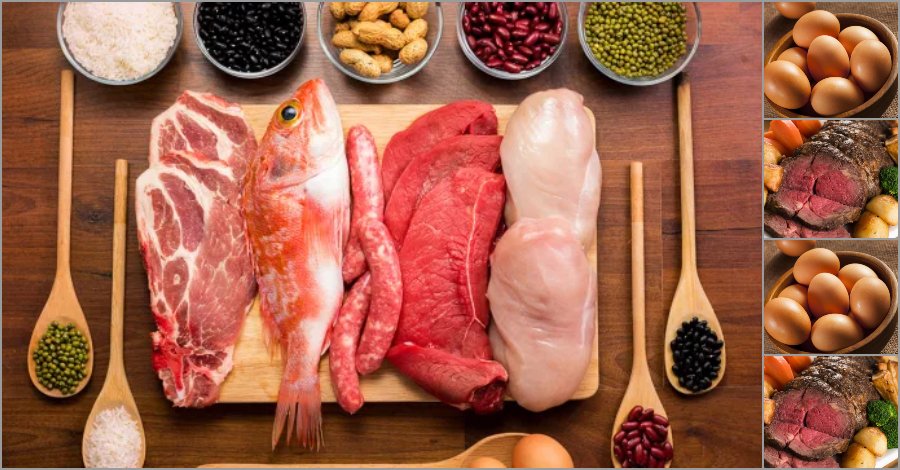Protein is an extremely vital nutrient in the body; in fact, it is one of the most important components of every cell in the body. Described as a “macronutrient,” protein, along with carbohydrates and fats, is needed in large amounts by the body.
Micronutrients such as vitamins and minerals are only needed in small amounts. Protein, unlike carbohydrates and fats, is not stored in the body. This means that the body has no cache to draw from when it needs a new supply.
Although this does not mean that you have to consume protein constantly, what it does indicate is that the protein we eat needs to come from better food sources. Quality is just as important as quantity.
As the main foundation of your body, life without protein would not be possible. It is used to make almost every component of the body from tiny molecules to organs and huge muscles. Several studies have been done to address the ideal amount of protein the average person should eat.
1. Whole Eggs
Loaded with more than just protein, eggs also contain several healthy fats, vitamins, minerals, and antioxidants.

- Total Calories: 75
- Protein: 7g
- Fat: 5g
- Saturated Fat: 1.6g
- Carbohydrate: 0.6g
- Cholesterol: 186.5mg
- Vitamins: A, B2, B12, B5, D, E, Biotin, Folic acid
- Minerals: Selenium, phosphorus, lutein and zeaxanthin, iron, and iodine
Related article: 16 Types Protein That Are Tasty And Lean protein And Help You Lose Weight
2. Chicken Breast
High in protein and low in fat, chicken breast is an excellent option for individuals who are trying to lose weight. One cooked, boneless, skinless, chicken breast weighing 100g contains, among others, the following:

- Total Calories: 98
- Protein: 23.21g
- Fat: 0.89g
- Carbohydrate: 0g
Related article: Burn Those New Year Calories And Start Your 2020 With This Fat-Blasting Workout
3. Salmon
Fish and shellfish are generally nutrient-dense. Of the foods high in protein, Salmon has a wealth of other nutrients and offers an excellent source of vitamins and minerals such as vitamin B12, selenium, and potassium. It is also famously high in essential omega-three fatty acids. One 100g serving salmon contains several nutrients, including:

- Total Calories: 131
- Protein: 22.25g
- Fat: 4.69g
- Water: 72.54g
- Calcium: 9mg
Related article: Try This Great Variation Of Nuts To Help You With Your Weight Loss Journey
4. Tuna
An affordable and healthy source of omega-three fatty acids, tuna is another high protein, low carbohydrate food, and contains almost no sugar or fibre. While the canned varieties do not contain the same nutritional value, one 100g serving of raw, fresh tuna contains:

- Total Calories: 144
- Protein: 23g
- Carbohydrate: 0g
- Cholesterol: 38mg
- Sodium: 39mg
- Vitamin A: 2183 IU
Related article: Why You Should Be Incorporating These Top 10 Foods When Bulking
5. Beef
Low in fat and sodium, beef is also an excellent source of vitamin B12, B6, phosphorus, zinc, and iron, riboflavin, selenium, and antioxidants. A 100g serving of beef primarily contains:

- Total Calories: 250
- Protein: 19.64g
- Carbohydrate: 0g
- Fat: 17.86g
- Fibre: 0g
Related article: The Yoga Workout Flow That Doubles As Cardio Session To Tone And Lose Fat
6. Almonds
Famous for their versatility and health benefits, almonds are the most popular nuts in the United States. Particularly beneficial in weight management, heart health, and prevention of diabetes, this plant-based protein makes one heart-healthy snack.

- Total Calories: 579 (per 100g serving)
- Protein: 21g
- Carbohydrate: 22g
- Fat: 50g
- Fibre: 13g
- Calcium: 269mg
- Iron: 3.71mg
Related article: Sculpt Your Body With This 7 Minute Cardio Fat Burning Sizzling Workout
7. Oats
Very low in cholesterol and sodium, oats are also low in saturated fats and an excellent source of dietary fibre. This whole-grain cereal also contains vitamins, minerals, and antioxidants. 100g of oat bran contains:

- Total Calories: 246
- Protein: 17.3g
- Carbohydrate: 66.22g
- Fat: 7.03g
- Fibre: 15.4g
- Phosphorus: 734mg
- Potassium: 566mg
- Calcium: 58mg
- Magnesium: 235mg
Related article: The Best Solutions To Help Prevent Sleep Problems And Aid A Better Sleep
8. Black Beans
Black Beans Classified as legumes, black beans are known for their high protein and fibre content. They also contain high values of vital vitamins and minerals. Black beans play a key role in maintaining healthy bones, managing diabetes, and many other health benefits. 100g of black beans contains:

- Total Calories: 339
- Protein: 21.25g
- Carbohydrate: 63.25g
- Fat: 0.9g
- Fibre: 15.5g
- Sugars: 2.12g
- Potassium: 1500mg
- Calcium: 160mg
- Magnesium: 160mg
- Phosphorus: 440mg
- Vitamin K: 5.6ug
Related article: 8 Exercises To Cinch Your Waist, Sculpt Your Shoulders, Lift Your Butt For A Sexy Hourglass Figure
9. Peanut Butter
Peanut butter contains all three macronutrients and is considered a fairly balanced energy source. Its low-carb content makes it suitable for low-carb diets. It is also high in healthy fats, making it a good option for weight-loss diets. 100g of peanut butter contains:

- Total Calories: 590
- Protein: 24g
- Carbohydrate: 21.83g
- Fat: 50g
- Fibre: 7g
- Folate: 92ug
- Vitamin E: 9.05mg
- Magnesium: 159mg
- Zinc: 2.78mg
Related article: The Best 20-Minute 8 Exercise Bodyweight Workout for Weight Loss
10. Cheese
This dairy product contains, in addition to protein, a variety of nutrients such as vitamins B12 and A, zinc, phosphorus, and calcium. It is also extremely versatile. Although it features several unhealthy foods, cheese on its own has several benefits. 100g of sliced cheddar cheese contains:

- Total Calories: 410
- Protein: 24g
- Carbohydrate: 2g
- Fat: 34g
- Fibre: 0g
- Vitamin A: 263ug
- Riboflavin: 0.43mg
- Vitamin B12: 0.88ug
- Vitamin K: 2.4ug

